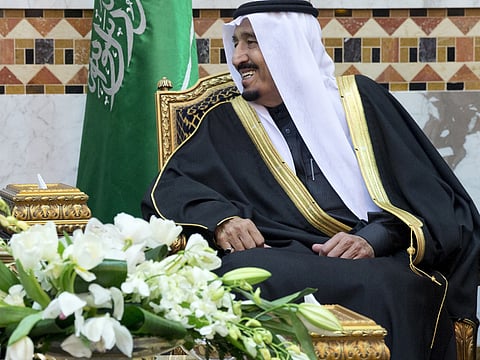Salman has issues to iron out in Washington
Now that the P5+1 deal is in place, the Saudi king and his GCC allies confront specific threats to regional and internal security

In what observers insisted was a strategically-timed visit, Saudi King Salman Bin Abdul Aziz will tomorrow share his apprehensions with United States President Barack Obama over the P5+1 (US, Britain, France, China, Russia plus Germany) accords with Iran over the latter’s nuclear programmes. With a little luck, he may impress on the White House genuine fears, especially since the deal was bound to accelerate an undesirable arms race. Will he succeed?
There was no doubt, as White House Press Secretary Josh Earnest told reporters aboard Air Force One a few days ago, that the visit “underscored the importance of the strategic partnership between the United States and Saudi Arabia”. That was well understood even by sycophants who regularly belittled the Saudi ruler because, allegedly, he suffered from various ailments. Far more important, critics highlighted that the trip was scheduled to erase the assumed snub by the Saudi ruler on May 14, 2015, when Obama convened Gulf Cooperation Council (GCC) leaders to his presidential retreat at Camp David, Maryland, for a rare summit to assuage latent concerns over the Iran deal.
At the time, denigrators read the absence as both a rebuke as well as a sign of Arab disquiet with US diplomacy, which was only partially correct. Although King Salman did not join fellow rulers, he delegated his heir, Crown Prince Mohammad Bin Nayef, and Deputy Crown Prince and Defence Minister, Prince Mohammad Bin Salman. The two men added their voices to the discussions even if they or, for that matter, other attendees were not persuaded by Obama’s justifications over the substance of the deal. Notwithstanding customary photo opportunities and spin declarations, GCC rulers remained sceptical of US views over the implications of the accord for regional stability.
In the event, and while few GCC leaders have said so, there seems to be unanimity over the Obama administration’s perceived naivete on Iran, which is a serious power with specific plans to assert itself not only throughout the Muslim World but also, and far more dangerously, over the entire Arab world, where sectarian tensions are on the rise.
King Salman will now have the opportunity to share his assessments with Obama who, and this must be acknowledged openly, is not well-known for listening to contrasting views. He will share his concerns over Tehran’s posture vis-a-vis Syria and its support of President Bashar Al Assad, a man who lost his legitimacy some time ago, even if Obama flip-flopped on the Damascene. He will impart insights on the malevolent influence that Iranian clerics enjoy over Iraqi Prime Minister Haider Al Abadi at a time when even Grand Ayatollah Ali Sistani insists on comprehensive political reforms that will reduce or end Tehran’s sway in Iraq. He will disclose the backing Al Houthi rebels in Yemen have received from Iran even if they are now using a major GCC member, Oman, to reach a political settlement as the ongoing war denied them yet another divine victory. He will reveal specifics of the mischief that Iranian agents are causing among Shiites in Bahrain and in Saudi Arabia’s oil-rich Eastern Province and, even if oil prices are low, of lingering dangers to vulnerable facilities that need to be defended. Last, but not the least, he will also touch upon the ‘Palestinian Question’ that Obama, like his predecessor, chose to overlook.
Obama, of course, anticipated all of these quandaries and looked beyond January 21, 2017, as he envisaged a wealthy post-presidential career. For now, and though he probably hoped that the Iran deal would ensure a favourable reading once he overcame Israeli Prime Minister Benjamin Netanyahu’s opposition, the American president needed to provide a few answers to his guest. Beyond exchanging ideas, the two men were duty-bound to evaluate inherent fissures in their ties, largely brought upon by Washington’s recent policies towards the Arab world. Regrettably, Obama mistrusted Arabs — especially Sunnis — through and through and perceived them as a source of existential threat to the US, while he concluded that Riyadh’s arch-rival was, to paraphrase former British prime minister Margaret Thatcher, a country with which the US can do business.
Now that the July P5+1 deal is in place, which means that crippling international sanctions against Iran will be lifted, King Salman and his GCC allies confront specific threats to regional and internal security. According to spokesman Earnest, the president and the king intend to take the necessary “steps to counter Iran’s destabilising activities in the region”, as well as “ways to further strengthen the bilateral relationship, including ... joint security and counter-terrorism efforts” — all of which were bound to translate into fresh arms sales.
There is no doubt that the sale of anti-ballistic missiles, among other systems that can enhance regional security, is a positive step. Still, what will truly make the trip a success may be an understanding over effective solutions to dissuade Iran from backing extremists in Iraq, Syria, Lebanon, Yemen and elsewhere. An even greater achievement for King Salman will be to dissuade Obama that Sunnis are not a source of threat and that Saudi Arabia, which is part of the US-led coalition fighting Daesh (the self-proclaimed Islamic State of Iraq and the Levant) was determined to fight and defeat all extremists.
Dr Joseph A. Kechichian is the author of Iffat Al Thunayan: An Arabian Queen, London: Sussex Academic Press, 2015.


